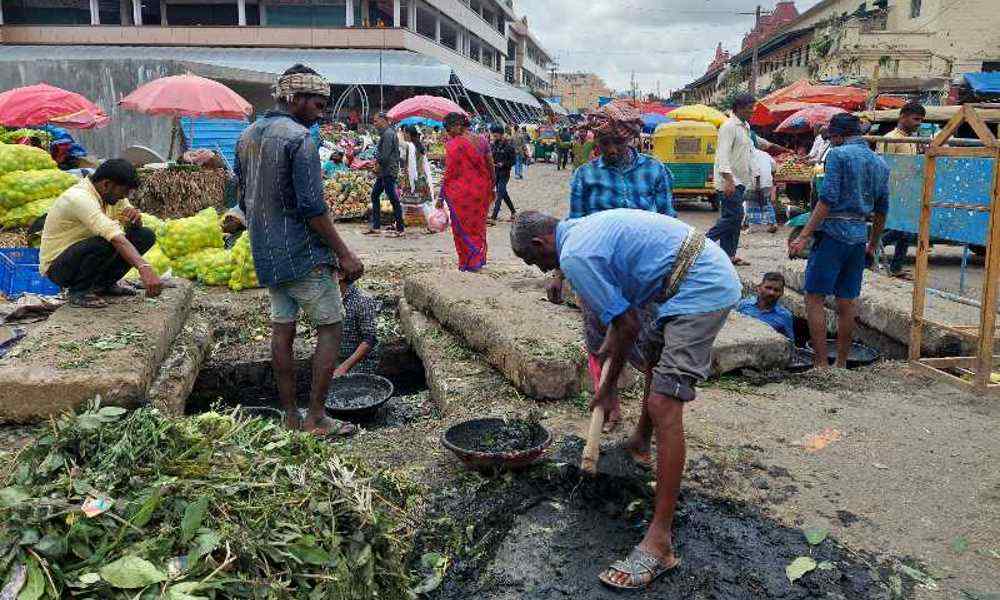BBMP has abolished manual scavengers but they are now being hired by private contractors.
Manual scavenging has been banned and the Bruhat Bengaluru Mahanagara Palike (BBMP) does not employ scavengers, but private contractors use them to clean septic tanks in the city.
S. K. Rajappa, a manual scavenger, from Mahadevapura said, “despite the ban, I still do it. After the ban, BBMP has stopped giving us work so private contractors hire us to clean septic tanks. For the past two to three years, we have been asking the BBMP to give us some different work, but they say that they don’t have any jobs.”
In the City Market, Pourakarmikas were cleaning ditches—something that has been banned under the Prohibition of Employment as Manual Scavengers and their Rehabilitation Act, 2013(PEMSR). Moreover, they were not equipped with protective gear, a common problem, said Rajappa.
He said that five months ago, a private firm had hired them to clean tanks and toilets in KR Puram for Rs. 500, per tank but the contractor did not provide them with any protective gear. Rajappa said that there were about a dozen others living in Mahadevapura who faced the same problem.
Vinay. K. Sreenivasa, an advocate at Alternative Law Forum said, “BBMP is ignorant towards private contractors who have been hiring them to clean septic tanks and toilets. Moreover, private contractors do not provide them with protective gear. So, this practice still prevails in the city.”
The Karnataka Safai Karamchari Commission (KSKC) data shows that in Karnataka 5,080 manual scavengers exist, out of which 1,424 manual scavengers are based in Bangalore. Data by KSKC shows that from 2015 to 2016, 13 scavengers died in Bangalore, while 2021 saw the death of 17-year-old Sri Mohan.
“Manual Scavengers risk their lives because they are exposed to many diseases such as dermatitis, gastric cancer, along with infections like leptospirosis, hepatitis and helicobacter. In addition, long exposure to hydrogen disulfide leads to death by asphyxia,” said Dr. Rachna Jain, General Physician and surgeon at Jain Hospital, Palanpur (Gujarat).
Siddarth Joshi from Safai Karamchari Kavalu Samithi said that in 2013, 110 villages in Bangalore did not have underground drainage which led the Bangalore Water Supply and Sewage Board (BWSSB) to say that these villages did not come under their jurisdiction. He said, “on the other hand, BBMP says that it is the responsibility of BWSSB. The problem of manual scavenging is oscillating between BBMP and BWSSB. Therefore, private contractors hire manual scavengers to clean sewage because they do not have any alternative.”
Shailaja, Special Commissioner, Welfare Department, BBMP said, “Government is pacing up the process of identification of manual scavengers in order to rehabilitate them to other occupations.” Deputy Commissioner, BBMP Welfare Department, K. Sreenavasan Reddy said, “The government has completely eradicated the problem of manual scavenging from the city and they are rehabilitating them to different occupations such as tailoring, beauty courses, driving, etc.”
However, the workers say that they do not get these jobs. Rajappa said, “We do not get jobs in other fields because people look down upon us because we are sewage workers.”
Reddy said that manual scavengers are provided with one-time cash assistance of Rs. 40,000 as mandated by the National Safai Karamcharis Finance and Development Corporation (NSKFDC). He added manual scavengers are themselves not willing to change their occupation because they say that it is the occupation of their forefathers. However, Siddarth Joshi said, “Manual scavengers do not have an alternative because the government is not providing them employment in other sectors.” Professor of Sociology at Bangalore University, Dr. R. Rajesh said, “Manual scavengers’ occupation is intrinsically linked to the caste system which is further linked to hierarchy due to which people discriminate against them and refuse them other jobs.”
Though the practice has been made illegal in the country, the socio-economic caste census shows that there are 15,375 households in Karnataka where at least one member does manual scavenging.





Great work!
Very well worked. Keep it up 🙂
A very important piece. Manual scavenging is a blot to our civilization and is akin to slavery.
This is a very common problem in India. Nicely researched and very well written. Keep up the good work
well researched
The state of implementation of laws is very sad, laws are made but they are bypassed and officers turn a blind eye to it. It is very unfortunate and it is only through spreding awareness and talking about such malpractices so that we can make informed attempts for elimination of such practices. Kudoos to those who make efforts to highlight plight of our fellow countrymen.
Great article! Need more such informative piece @anupreksha jain
Unseen reality!
well focused , keep it up
Very good coverage.. keep it up..
Nice article.godspeed